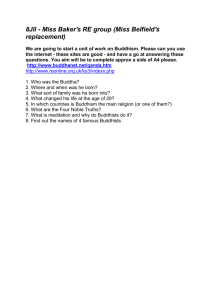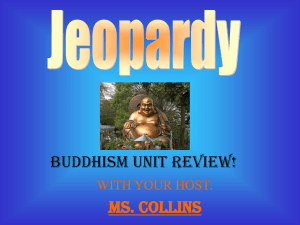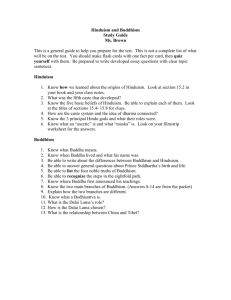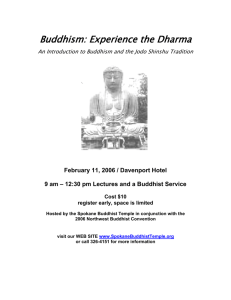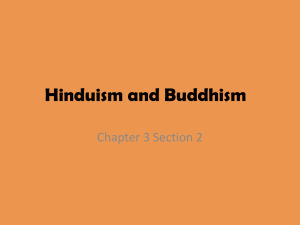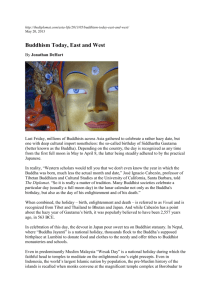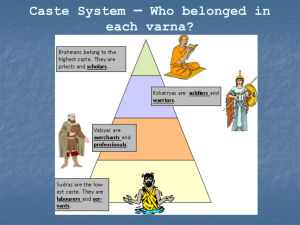Religion or Philosophy? by Arnie Kozak, Ph.D. Can you have a
advertisement
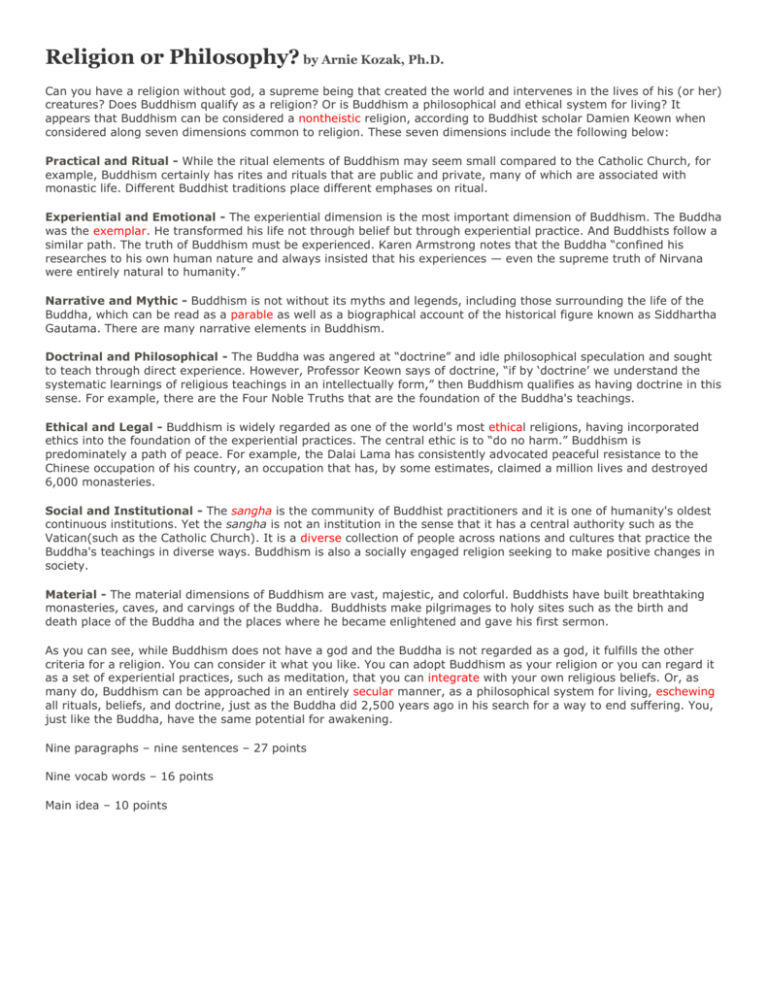
Religion or Philosophy? by Arnie Kozak, Ph.D. Can you have a religion without god, a supreme being that created the world and intervenes in the lives of his (or her) creatures? Does Buddhism qualify as a religion? Or is Buddhism a philosophical and ethical system for living? It appears that Buddhism can be considered a nontheistic religion, according to Buddhist scholar Damien Keown when considered along seven dimensions common to religion. These seven dimensions include the following below: Practical and Ritual - While the ritual elements of Buddhism may seem small compared to the Catholic Church, for example, Buddhism certainly has rites and rituals that are public and private, many of which are associated with monastic life. Different Buddhist traditions place different emphases on ritual. Experiential and Emotional - The experiential dimension is the most important dimension of Buddhism. The Buddha was the exemplar. He transformed his life not through belief but through experiential practice. And Buddhists follow a similar path. The truth of Buddhism must be experienced. Karen Armstrong notes that the Buddha “confined his researches to his own human nature and always insisted that his experiences — even the supreme truth of Nirvana were entirely natural to humanity.” Narrative and Mythic - Buddhism is not without its myths and legends, including those surrounding the life of the Buddha, which can be read as a parable as well as a biographical account of the historical figure known as Siddhartha Gautama. There are many narrative elements in Buddhism. Doctrinal and Philosophical - The Buddha was angered at “doctrine” and idle philosophical speculation and sought to teach through direct experience. However, Professor Keown says of doctrine, “if by ‘doctrine’ we understand the systematic learnings of religious teachings in an intellectually form,” then Buddhism qualifies as having doctrine in this sense. For example, there are the Four Noble Truths that are the foundation of the Buddha's teachings. Ethical and Legal - Buddhism is widely regarded as one of the world's most ethical religions, having incorporated ethics into the foundation of the experiential practices. The central ethic is to “do no harm.” Buddhism is predominately a path of peace. For example, the Dalai Lama has consistently advocated peaceful resistance to the Chinese occupation of his country, an occupation that has, by some estimates, claimed a million lives and destroyed 6,000 monasteries. Social and Institutional - The sangha is the community of Buddhist practitioners and it is one of humanity's oldest continuous institutions. Yet the sangha is not an institution in the sense that it has a central authority such as the Vatican(such as the Catholic Church). It is a diverse collection of people across nations and cultures that practice the Buddha's teachings in diverse ways. Buddhism is also a socially engaged religion seeking to make positive changes in society. Material - The material dimensions of Buddhism are vast, majestic, and colorful. Buddhists have built breathtaking monasteries, caves, and carvings of the Buddha. Buddhists make pilgrimages to holy sites such as the birth and death place of the Buddha and the places where he became enlightened and gave his first sermon. As you can see, while Buddhism does not have a god and the Buddha is not regarded as a god, it fulfills the other criteria for a religion. You can consider it what you like. You can adopt Buddhism as your religion or you can regard it as a set of experiential practices, such as meditation, that you can integrate with your own religious beliefs. Or, as many do, Buddhism can be approached in an entirely secular manner, as a philosophical system for living, eschewing all rituals, beliefs, and doctrine, just as the Buddha did 2,500 years ago in his search for a way to end suffering. You, just like the Buddha, have the same potential for awakening. Nine paragraphs – nine sentences – 27 points Nine vocab words – 16 points Main idea – 10 points


